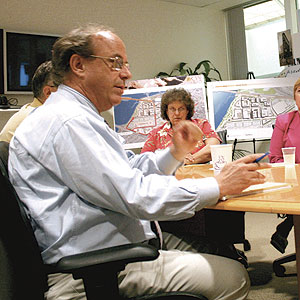
Wig Zamore says that the MPO funding plan will not meet the legal obligations of the state. - Photo by Andrew Firestone
Zamore: GLX still in limbo
By Andrew Firestone
The Green Line Extension (GLX) project was given a boon this last Thursday, September 20, in the form of $490 million worth of bonds being approved for Somerville road repaving and design of the project by the Boston Metropolitan Planning Organization (MPO). The approval, following the abandonment of the Red Line-Blue Line connector and a decision by the MPO to buy 24 additional trains also comes with the expectation that there will be an additional $100 million provided by the federal New Starts program.
However, Community Organizer Wig Zamore, who works with the Somerville Transit Equity Partnership (STEP) said he was not overly optimistic about these new steps translating to a completed project. The MPO approves and directs funding for all transit projects across the state.
“They really were obligated to approve 100 percent of the Green Line funding and show what the sources [of funding] were and they haven’t yet showed what the sources are,” said Zamore. “They don’t have any federal New Starts [funding] yet and they don’t have a state bond cap that’s high enough to get the green line project yet.”
Mayor Joseph Curtatone said in a statement that he was pleased that the Transportation Improvement Plan (TIP), had approved bonding. “The important thing from Somerville’s perspective is that the TIP has hundreds of millions in designated funds that will help the project break ground and ensure that new stations are getting built. This is a major commitment from the State.”
Somerville officials and legislators have pushed the state for a quicker and more solid schedule following an announcement of delay for the project to 2018-2020. While they say the approval of the bonds shows signs that they are going to cooperate, Zamore said that it wasn’t enough as it relied upon federal funding that might be cut from the budget.
“If they should get federal New Starts funding, then the state will not have to come up with anymore money,” said Zamore. “But in the meantime, the state does have to raise bond allocation,” he said, to meet the $1.2 billion dollar price tag of the project.”
“It’s not a legal situation right now,” he said implying that the lack of concrete funding and planning did not take the state to a level where they meet their legal obligation under the 2005 lawsuit by the Conservation Law Foundation.
“What they’ve stepped up to is significant, but it just does not meet up to the letter of federal regulations,” he said.
“Everyone recognizes it will take more money than just what is in the TIP to complete the Green Line extension,” said Curtatone. “Yet a large part of that is because the federal contribution to the project has yet to be determined. That may take some time to lock in, but in the meantime there are more than ample funds to get the project underway.”
The Green Line Extension was presented as a solution to mitigate pollution during the beginning phases of the Big Dig almost 23 years ago.
“The problem is, in the last four years, their expected completion date has moved out eight years. So they’re actually moving backwards two years for every real-time year that elapses. That’s not something that is going to deliver the project,” said Zamore.
Zamore, who closely follows the project, said that the state and their planning team for the project had not lived up to the promise of bringing the GLX to Somerville and saw their failure as a lack of understanding for the basics of their initiative.
“I don’t even think they’ve compared their own manpower and resource-spending to the other good light-rail projects that have been done in this country for the last 10, 20 years. I just think they’re working in vacuum here and that’s not a good way to work,” he said. “There’s lots of cities in the United States that successfully built light-rail projects that didn’t have the transit base that we have, some of them built both ahead of schedule and under-budget.”
When asked about the possibility of Secretary of Transportation Richard Davey asking the state legislature for more bonds to fund the project fully, an act he has stated he will not do, Zamore said it was a no-brainer.
“Well, he doesn’t have a choice,” he said. “He has to.”
Once Governor Deval Patrick signs on, these funds can be used.
















Reader Comments